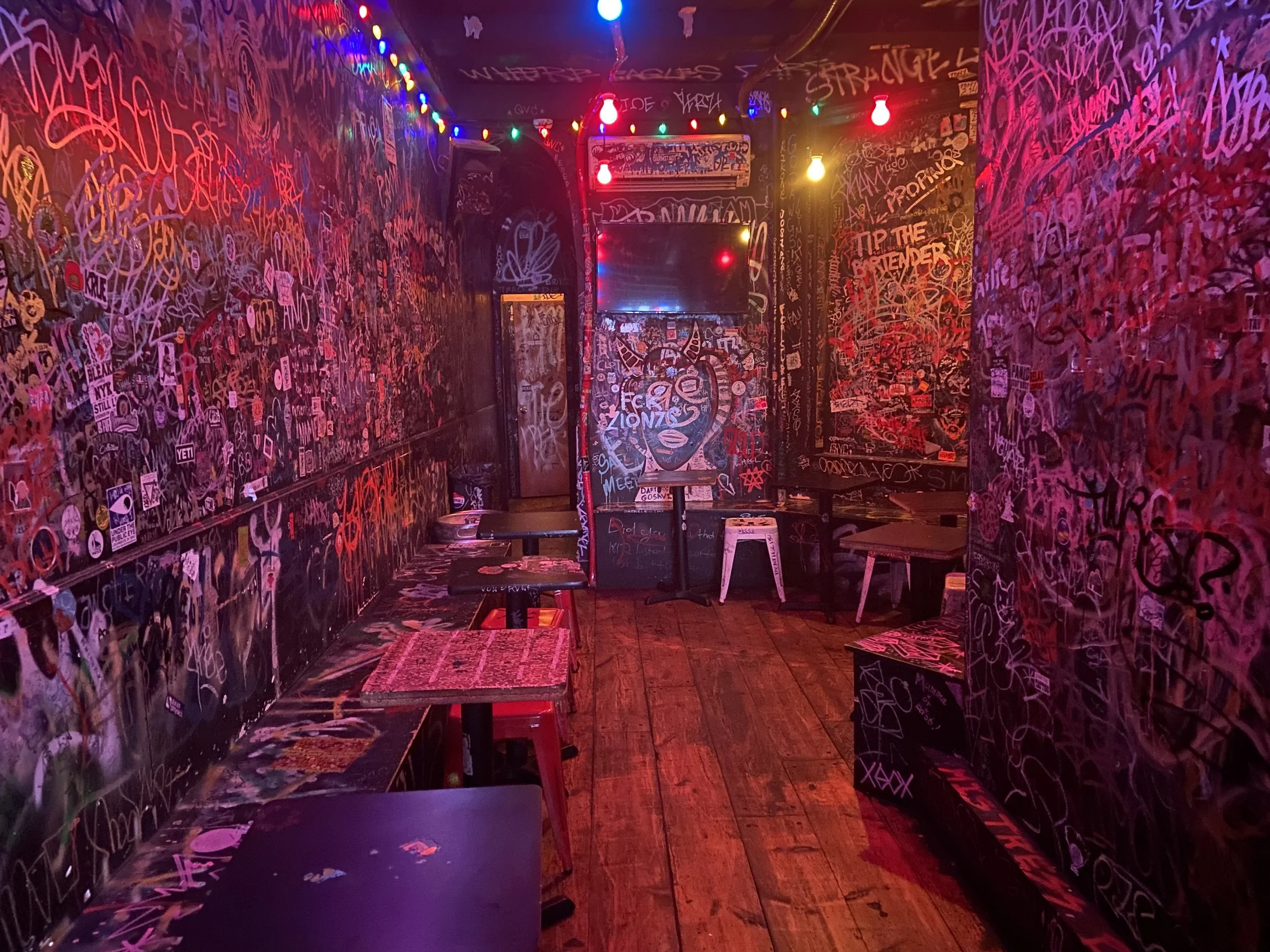There’s something jarring — almost surreal — about finding a graffitied punk rock bar nestled between the glass facades of Midtown Manhattan. Strange Love NYC, located on 53rd Street between Second and Third, is a holdout. An echo. A glitch in the matrix. A space that shouldn’t exist — and yet defiantly does.
In a city where even the dive bars have brand managers, where aesthetic rebellion is repackaged and sold back to us as curated grunge, walking into a real punk bar feels like stepping into a time machine. Or maybe more accurately, into a moment of resistance. A refusal. A middle finger aimed squarely at the sterile, moneyed absurdity of contemporary life.
✊ The Aesthetics of Refusal
The bar itself is chaos. Graffiti on the walls, loud punk music blasting through battered speakers, and bartenders who don’t perform hospitality so much as tolerate your presence. It’s everything a Midtown office worker in a fitted blazer is taught to fear — or worse, fetishize.
And yet, for all its noise and grime, the space feels more honest than any fluorescent-lit boardroom or open-plan co-working hive. There’s no pretense of productivity here. No screens. No apps. No performative mindfulness. Just bodies in space, music that refuses to be background, and the anarchic scent of something real.
This isn’t just a bar. It’s what Michel Foucault might have called a heterotopia — a space that functions outside of and in contrast to the dominant social order. Strange Love is not “useful.” It doesn’t optimize your workflow or add value to your brand. And that’s exactly why it matters.
🏢 Corporate Hell and the Spectacle
To stand in Strange Love with a $6 beer in hand, surrounded by sweat and distortion pedals, is to realize how anesthetized the world has become. Guy Debord warned us of this — the society of the spectacle, where all social life is reduced to appearance, to image, to endless representations. Everything is branding. Everything is content.
And punk? Punk was never content. It was confrontation. It was ugly. It was inconvenient. It was, in its purest form, a philosophy of subtraction: subtract respectability, subtract safety, subtract structure — and see what remains.
Now we live in a world where rebellion is neatly packaged by ad agencies and sold to us through ironic slogans on $200 hoodies. Where protest is aestheticized but not practiced. Where we scroll through curated nihilism while sipping oat milk lattes.
In this context, Strange Love doesn’t just feel like a bar. It feels like a last stand.
💀 Punk as Philosophy
Punk has always been more than music. It’s a metaphysical posture — a rejection of the polite lie that things are okay. A Nietzschean scream against the Apollonian order of corporate culture, in favor of the Dionysian chaos of lived experience. It is, in its most distilled form, anti-structure.
But now we live in an age where even chaos is simulated. Where curated authenticity has replaced spontaneity. Where TikTok trends flatten everything into content categories and Spotify algorithms ensure that even your rebellion fits a mood playlist.
To walk into a bar like Strange Love is to remember that there once was — and still might be — a different way of being. One that isn’t filtered, packaged, optimized, or monetized. One that is dirty, loud, and ungovernable.
And maybe that’s why the bar feels so alive. Because it shouldn’t be there.
🧠 On Alienation and Place
There’s a strange kind of alienation in our hyper-modern world. It’s not the alienation Marx described — not just the worker from the product — but the individual from place. From experience. We live in cities we barely touch. We walk past buildings we’ll never enter. We sit in sanitized spaces that erase any trace of the people who were there before us.
Strange Love is the opposite. Every inch of it bears the marks of bodies, of stories, of rage and release. The graffiti is layered. The stickers are peeling. The floor is scuffed. And in that mess, there’s meaning.
Walter Benjamin once said that to experience the aura of a place is to feel its uniqueness — its presence in time and space. In a city that’s rapidly losing its aura to chain stores and glass towers, Strange Love glows like a dying star.
🚬 The Last Real Room
As I stood there — a bald guy with an MFA and a head full of regrets — I couldn’t help but think:
This bar is what art school never prepared me for.
This noise is what museums can’t contain.
This feeling — this aliveness — is what we’re all chasing but rarely find.
Strange Love doesn’t pretend to have answers. But it asks a better question than most institutions ever dared:
What if we stopped pretending?
What if we stopped pretending to be okay?
To be productive.
To be normal.
To be clean.
Maybe, in this punk rock bar in the middle of corporate hell, we remember something ancient: that rebellion isn’t about winning. It’s about refusing to surrender.
And maybe that’s all we really need to do sometimes.
Refuse.
Resist.
Drink a cheap beer.
And scream into the void.
With company……….


